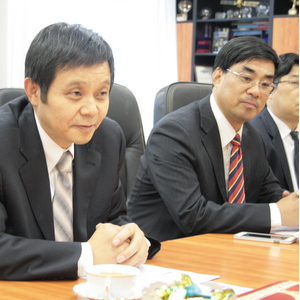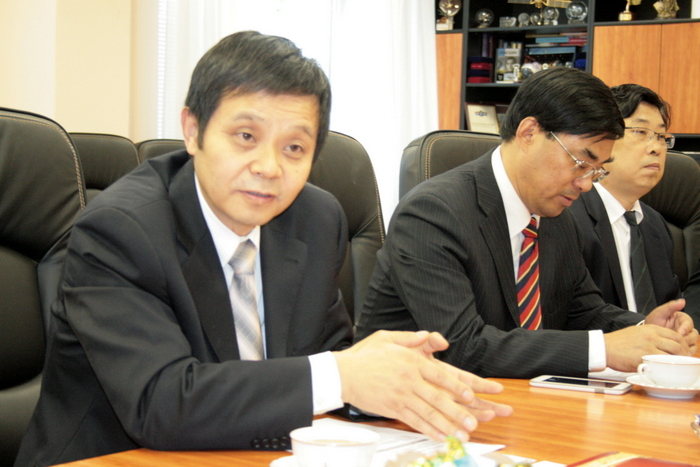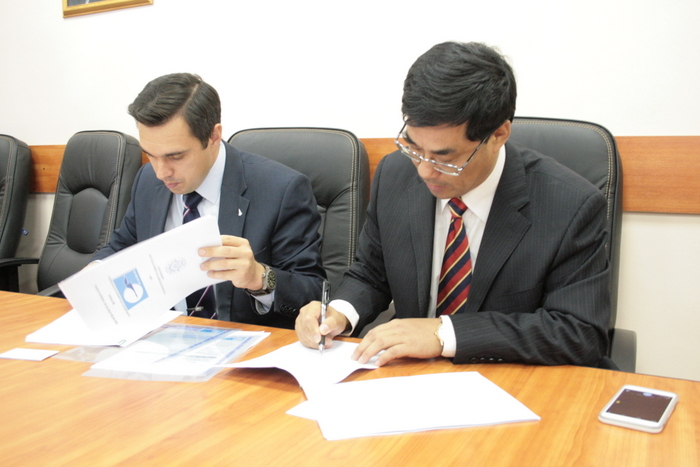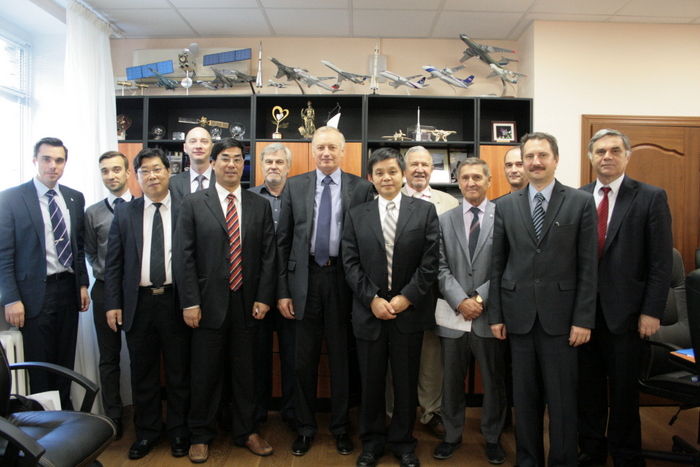
On September 16 Samara State Aerospace University (SSAU) delegation visited the Nanjing University of Aeronautics and Astronautics (NUAA). The delegation included Nie Hong, NUAA President, Song Indon, Dean of the Faculty of Energy and Power Engineering of the University, and Gao Kanfa, Deputy Dean of the Faculty of Aerospace Engineering.
The delegation from China visited the Department of Aircraft Operation and Aircraft Construction and Design Samara State Aerospace University, as well as the Centre of Aviation Engines History.
A memorandum of intent between SSAU and Nanjing University, which requires SSAU and NUAA cooperation, as well as organization of academic mobility and student exchanges was signed at the meeting with Yevgeniy Shakhmatov, SSAU Rector.
“I think that our universities’ potential may help students and young scientists to build their successful career. First of all, the mission of our cooperation is that the young people of our two countries were able to create a new technologically advanced world, solving space exploration problems, as well as those that occur here on the Earth”,- noted Yevgeniy Shakhmatov, SSAU Rector at the meeting. “We hope to organize both academic mobility and student exchanges between our universities: over two hundred employees from abroad work and 800 foreign students study here annually”, - said in return Nie Hong, NUAA President, stressing that Samara Aerospace University possess recognised competence in China (see Reference).
Nanjing University of Aeronautics and Astronautics is one of the best technical universities in China. It specializes in engineering, aviation and space technology. It has the following faculties: Aviation and Aerospace Technology, Automation Systems, Material Science, Electronics, IT, Civil Aviation and others.
NUAA Students develop spacecraft – nanosatellites, that creates additional prerequisites for cooperation between Nanjing University of Aeronautics and Astronautics and the Samara State Aerospace University.
“SSAU Students together with Samara Rocket and Space Centre “Progress” create spacecraft. In December this year, the first rocket, which payload make our two students’ satellites, will be launched from the new Russian space launcher complex Vostochniy located, by the way, just 200 kilometers from the border with China. In the future, we intend to create a spacecraft for the Earth’s remote sensing by our students in collaboration with students from other countries”, - said Yevgeniy Shakhmatov, SSAU Rector.
During the visit, the sides agreed to start cooperation in scientific and research activity in the areas of aviation and engine building.
For reference
In 2003, China became the third space superpower after Russia and the USA, which has its own man-rated astronautics. Currently, China is one of the stakeholders in the global market of launch services, builds its own multi-module permanently manned space station, and intends to land its taikonauts on the Moon after 2020.
Chinese “space tug” was largely due to the dedicated experts training of Celestial Kingdom in the Russian training rocket and space centres. As early as in 1991, the Department of Space Engineering of Kuybyshev Aviation Institute (nowadays - SSAU), began to train a group of students on a specialty “Spacecraft” in Harbin Institute of Technology, China. Teachers of the department went to China on a long business trips, read lectures, conducted laboratory practices and led course projects. Protection of the graduation projects of Chinese students took place in SSAU. Nowadays, the first graduates of SSAU Department of Space Engineering hold leading position in China's space industry.
Since 2004, SSAU also has a system of long-term study placement of the students from Beijing University of Technology (BIT). The study placement takes place at the Department of Aircraft Construction and Design. According to results of the study placement students defend a bachelor thesis project first in SSAU, then at home. Training is conducted in English. Over eighty bachelors have been trained during 11 years of work.
In 2009, an agreement on training Chinese bachelors in Samara in the area of “Space” was signed between SSAU and Harbin Institute of Technology. Since that time three graduating classes of bachelors with total number of 35 people finished the training. Currently, 25 people are trained at SSAU Department of Space Engineering.
In 2015 Russian-Chinese Laboratory “Space Cable Systems” was made in SSAU. Scientists of SSAU Department of Space Engineering together with Chinese colleagues from the Institute of Automation Northwestern Polytechnical University will be engaged in research of space cable systems. The Laboratory is led by Sergey Ishkov, SSAU and Wang Wei, NPU Professor.















